Interview with Ambassador Stephan Auer of Germany in Seoul
By Publisher Lee Kyung-sik with Editors Choe Nam-suk, Sung Jung-wook
Ambassador Stephan Auer of Germany in Seoul said, “The Day of German Unity celebrates the German Reunification after half a century of division.”
In a written interview with The Korea Post, publisher of 3 English and 2 Korean news media since 1985, Ambassador Auer then added: “The events in 1989/1990 form a watershed moment in history. The German reunification brought divided people together, laid the foundation for a deepening of European Integration and signaled the end of the cold war in Europe.”
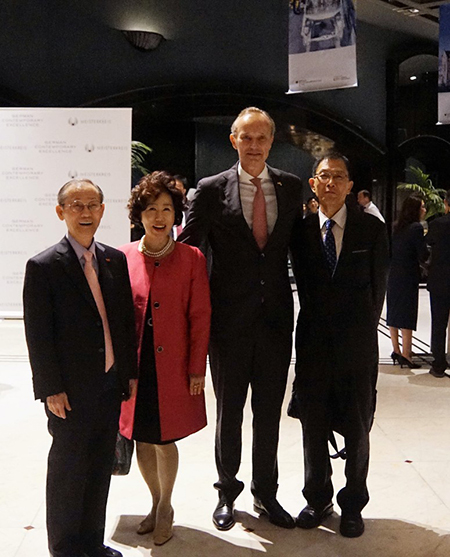
The history of Korean-German relations dates back to 1883 when the two countries signed a friendship and trade agreement.
However, the bilateral relations thence underwent various ups and downs of the modern history until 1955, ten years after Korea was liberated from the Japanese colonial rule on Aug. 15, 1945.
Korea and Germany re-opened diplomatic relations in 1955.
Thenceforth, Korea and Germany have achieved eye-opening developments in the area of mutual cooperation.
According to the Ministry of Foreign Affairs of Korea, Germany is the largest trading partner of Korea in Europe with the volume of bilateral trade reaching US$27.4 billion and German investments in Korea totaling US$13.26 billion, the third largest investor country in Korea from Europe.
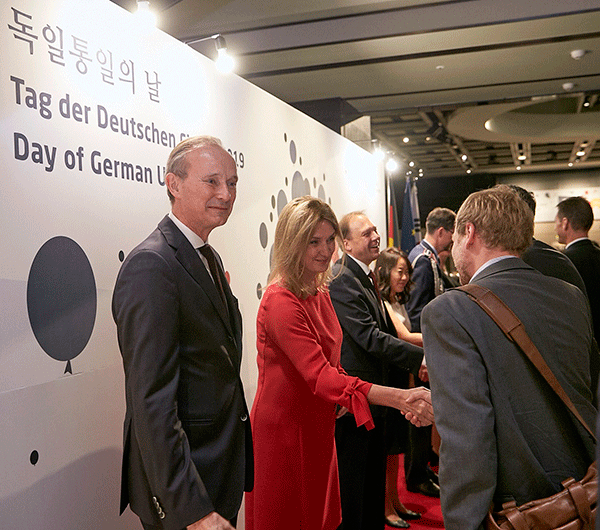
In addition, Korea and Germany are continuously increase their win-win bilateral cooperation in various fields, including fourth industrial revolution, new renewable energy, vocational training, small-medium business and ICT.
Korea and Germany are both members of G20 and OECD and are jointly working in various fields for the promotion wellbeing of mankind.
In the cultural field, too, Korea and Germany have deep relations thanks to such noted personalities as Composer Isang Yun and Writer Mirok Li.
Excerpts from the interview with Ambassador Auer follow:
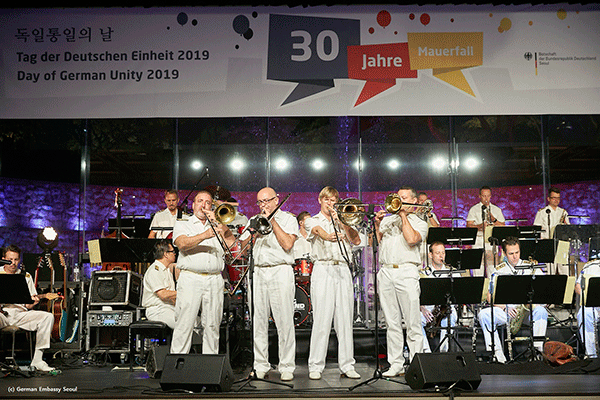
Question: Please introduce the Germany Unity Day.
Answer: The Day of German Unity celebrates the German Reunification after 40 years of division. The events in 1989/1990 form a watershed moment in history. The German reunification brought divided people together, laid the foundation for a deepening of European Integration and signaled the end of the cold war in Europe.
This year we also celebrate the 30th anniversary of the Fall of the Berlin Wall, which came about in a peaceful Revolution. Regular East-German citizens took to the street to protest against division and to demand freedom, liberty and democracy. To this day, it is still a miracle that we have been able to achieve all this without barely any bloodshed.
Of course, the Day of German Unity holds also a special significance for Koreans taking into account our common history as divided peoples. I sincerely wish our Korean friends nothing more than that they, too, can overcome the division and, in the not too distant future, celebrate reunification in peace and freedom.
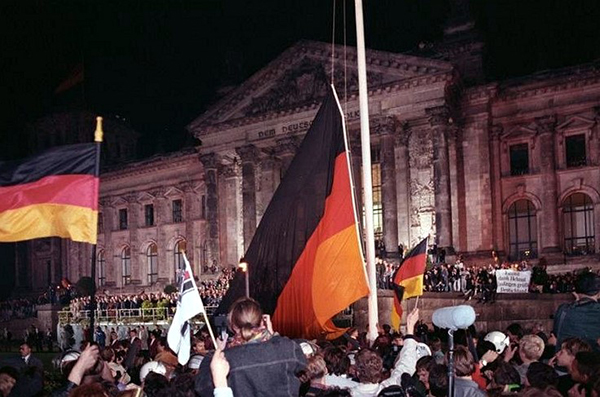
Q: What are the major developments in the area of economic cooperation between the two countries this year?
A: Both Korea and Germany are economic powerhouses with very close and vibrant bilateral economic ties. With its highly competitive economy and advanced technological capabilities, Korea is one of Germany’s major trading partners in East Asia. Korea is the third most important market for German goods in Asia and Germany remains by far Korea’s most important European trading partner.
To make it more concrete: Bilateral trade in 2018 was worth approximately 30 billion US dollars. In the past years we have seen Korean imports to Germany increase steadily – mostly in the field of electronics.
In 2018 alone, German companies invested more than 100 million US dollars. In total, there are about 500 German companies or firms with German equity participation operating in the country, employing a local workforce of approximately 100,000.
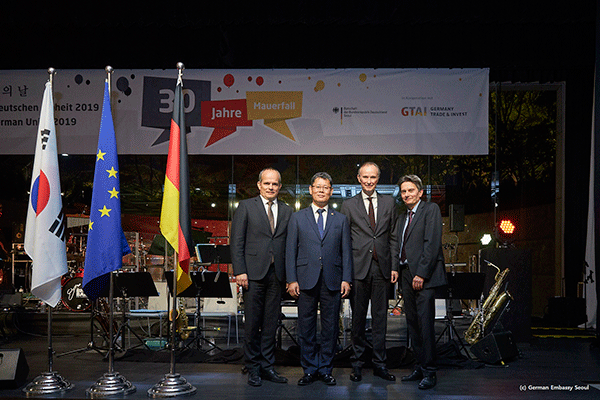
With no doubt, one economic highlight was once again the Hannover Fair in spring 2019, attracting 6.500 exhibitors from 73 countries. This World Class event focused mainly on Industrie 4.0, integrated energy systems, artificial intelligence, Cobots (robots reacting to humans), light weight construction, as well as on digital platform economics – all relevant topics in the German-Korean business and technology partnership.
Business-to-business relations between German and Korean companies have prospered again in the past year. Throughout 2018, our Chamber of Commerce and Industry has been organizing business seminars and conferences, such as the Korea-Germany Tech Conference on materials, parts and equipment – together with MOTIE and KITA.
Our annual bilateral economic consultations took place in October – already for the 32th time! This demonstrates quite well how profound and trustworthy our economic relations are. The meeting helped to move forward bilateral trade and investment activities even further, paving the way for cooperation in various future-oriented sectors, such as small and medium-sized enterprises, start-ups, digitization, AI and mobility.
We also kicked-off a new regular dialogue format on financial and macroeconomic issues which will allow for even closer coordination and help us to better navigate through the troubled waters of trade disputes.
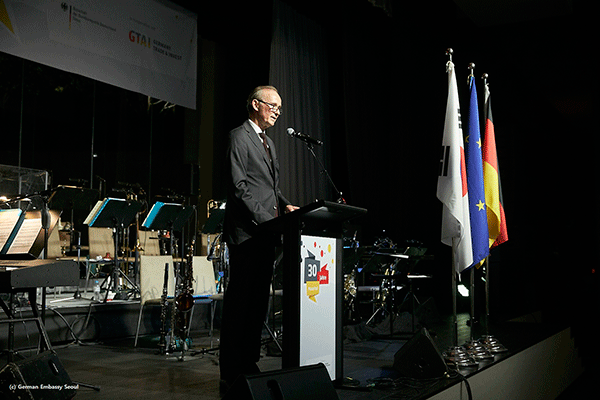
Q: What are prospects of economic cooperation between the two countries this year and in the near ture?
A: Korea and Germany have many common interests. The prosperity of both our countries largely depends on the free exchange of goods. Therefore, we must defend free and rules-based bilateral and global trade. The Korea-EU Free Trade Agreement constitutes a strong asset that allows for increased exchange and cooperation between our companies.In times of rising protectionism, the deepening of our Free Trade Agreement and the abolition of non-tariff trade barriers would send a very strong message of support for free trade. Indeed, direct bilateral cooperation between German and Korean companies can help them remain competitive as they strive for innovation and work to maintain their technological lead.
Climate change and the need to secure a reliable, sustainable and affordable energy supply is another field where enhanced cooperation could be very beneficial to both our countries. Germany has been at the forefront when it comes to the transformation of our traditional fossil fuel-based energy systems to a CO2-neutral system through the development of renewable energies and the increase of energy efficiency. As we phase out nuclear energy, we have also begun to reduce the use of fossil fuels for energy production. This has not been easy, but as renewable energies become more and more competitive, the German energy transition, or so-called “Energiewende,” is becoming a success story. Germany will gladly share its experiences and “lessons-learned”. The 8.International Renewable Energy Conference (KIREC) which took place in Seoul end of October, as well as various meetings and events on the sideline, such as the 2. Korean-German Energy Day, have clearly identified the huge potential for intensifying cooperation in various fields. The broad spectrum stretches from energy efficiency in transport and buildings to wind energy and green hydrogen. In the near future we intend to sign an agreement on energy partnership which will allow us to further build upon.
For sure, there’s much more: As various German cities – just to name Berlin - have established themselves as new European hubs for tech start-ups there is much common ground to work together, notably in the area of digitization. And we feel that the highly successful German-Korean vocational training program with more than 300 Korean high school students all over Korea could be just the beginning…
Q: Who are the up-and-coming German companies in Korea and who are such Korean companies in Germany?
A: You may understand that it is difficult to single out companies not least because there are quite many high performing “champions”. I was, however, very impressed by four companies that were honored by a high ranking jury at the 5th Korean-German Chamber’s Innovation Awards last September for their innovative ideas, solutions concepts and products: “Bitsensing Inc”. for their High Performance 4D Radar being stable in all weather conditions and providing a highly reliable performance at an affordable price, “42Maru” for providing an innovative deep-learning-based natural language question answering system that can navigate any types of a large unstructured data set and deliver a single answer to any question, “BASF” for a fully biodegradable and compostable mulch film which primarily tackles plastic wastes in the agricultural sector as well as “Henkel Korea” for reducing the amount of the carbon footprint and waste worldwide through their mechanical assembly methods and adhesive technology replacing billons of meters of tape used in manufacturing processes.
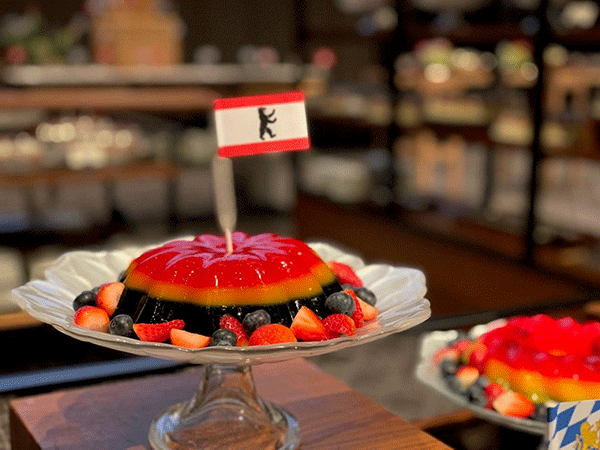
Q: What are the tourist attractions in Germany, especially those attractive to business people?
A: I could mention the bustling and multicultural capital city of Berlin or the wonderful scenery of the Bavarian Alps with the regional capital Munich. But, today I would like to highlight three particular cities which don’t always get the attention they deserve.
The well-known guidebook “Lonely Planet” has selected the city of Bonn as one of the Top Ten cities to visit worldwide in 2020. Next year is a great timing to visit Bonn to celebrate the famous composer Ludwig van Beethoven’s 250th anniversary in his native town. And I am personally very attached to this pleasant city on the river Rhine where I lived and studied for a number of years: It was not only Beethoven who was born there, but also my son.
People from Busan might want to visit Hamburg, its twin city in northern Germany. Hamburg is famous for its impressive harbor, the renowned Fish Market, its narrow canals, bridges and streets along the world's largest contiguous warehouse complex or the recently completed Elbphilharmonie. For all these attractions and many more Hamburg is considered to be Germany’s “pearl of the North”.
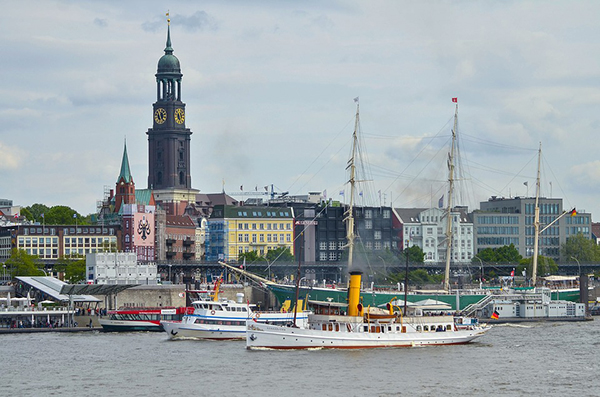
Thirdly, many Koreans might remember Baden-Baden as a city of luck, since it was there where the Olympic Committee, in 1981, selected Seoul as a host of the 1988 Summer Olympic Games. Baden-Baden is the city of luck also in an another sense: Many of tourist test their luck in the famous Casino Baden-Baden. But the city is a perfect destination for those who seek rest and recuperation as well as it is nicely located near the Black Forest and boasts impressive spa facilities.

